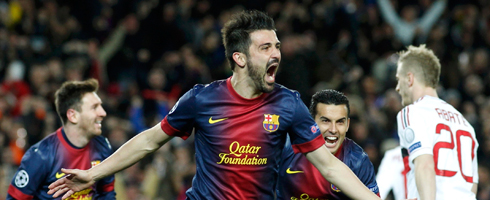They said it could not be done. In the history of the Champions League, no team had never managed to overcome a 2-0 first leg deficit to win a tie. Lionel Messi had never scored against Italian opposition from open play whilst no-one believed that Barcelona could keep a clean sheet. Far be it for anyone to underestimate the ‘best team in the world’ but they needed to rely on a certain David Villa to make their European dreams come true.
An injury that saw him side-lined for eight months and the apparent loss of confidence from Coach Tito Vilanova, few foresaw a future for Villa at Barcelona. Restricted to a few minutes in insignificant games, when the time came to play Real Madrid in the Copa del Rey semi-final, the forward was left out once again. It seemed the player’s time at the Catalan club was coming to an end.
However, just prior to leaving to New York to continue his cancer treatment, the Barca Coach held a brief meeting with the player to assure him that he would play a vital role in the second half of the campaign. Despite relying on him only a handful of times, Vilanova needed Villa and he needed the player to feel important to the project.
Yet his chances were still very much limited despite some excellent displays by the player, especially in the match against Sevilla. Deployed from the start in Saturday’s game against Deportivo, the forward spurned the team’s best chance for goal after 24 minutes. His faithful fans began to question whether their Coach had it right all along. Villa was not playing like Villa and perhaps he was no longer the forward Barca could rely on.
That was until he played Milan. Tasked with occupying the centre-backs to create space for Messi to work with, the Spaniard not only added depth to the side but he permitted his teammate the tools with which to shine. By playing up top as a sort of central striker, Messi was then able to drop deeper and partake in the construction of Barca’s play. With El Guaje pushing Milan’s centre-backs and interrupting Philippe Mexes’ marking obsession, the Argentine was then permitted an inch of space to deliver the first goal of the game in the first five minutes of the match.
Speaking after the match, Roura highlighted the reasons why he and Vilanova so desperately wanted Villa to play: “Our intention was to fix their centre-backs into position so that they would not feel so comfortable to come out and pressure our players inside.” He went on to explain how Villa added depth and indeed it was his vertical edge that transformed Barcelona from a purely horizontal team into a predatory goal seeker.
However, Villa did more than allow Messi room to play. It was his clever movements and incessant pressing that aided the stifling of Milan’s ability to construct their own movements. The key to Barca’s win on Tuesday night was their pressing game. That need to win back possession in advantageous positions allowed for a more direct route to goal whilst it limited the impact of their opponents.
With two scored in the first half, Barca’s first objective was met. Then El Guaje scored. “This is David Villa!” exclaimed Dani Alves. With Xavi Hernandez delivering a sumptuous ball to the forward, Villa netted with his left foot to allow his side the advantage, sending the home support into a ride of delirium.
An overwhelming majority of Marca and AS readers had voted for Villa to start against Milan in online surveys. Now we know why. Barcelona believed in their ability, Villa believed in his, and together they produced a performance that reminded Europe of the club’s supremacy.

